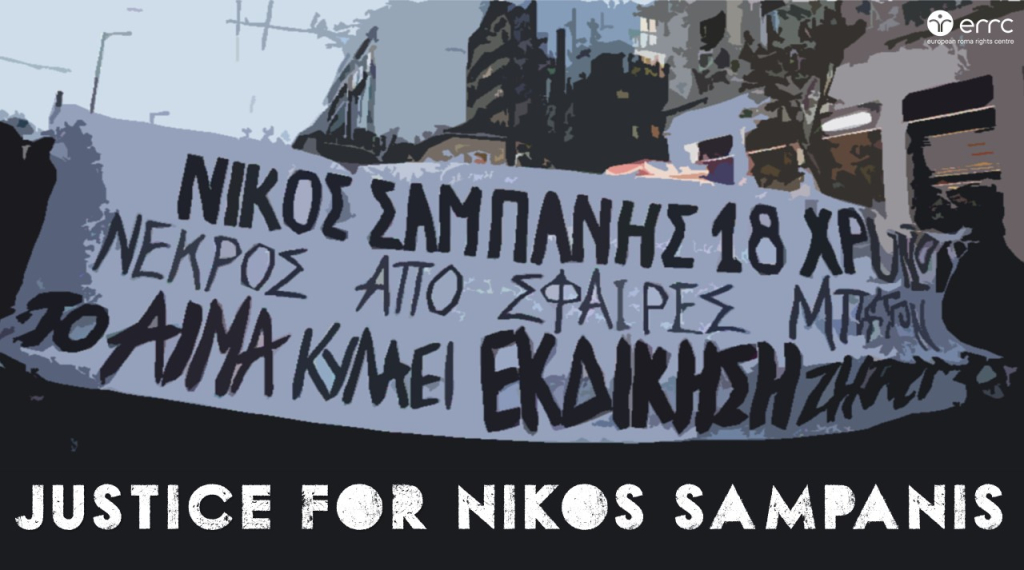Greece: three years after police kill Romani teen, investigators accused of stalling
29 October 2024

Three years after Greek police shot dead one 18-year-old Romani youth and wounded two others, human rights defenders and defense attorneys for the families issued a formal protest about the lack of any progress with the investigation into the shooting. According to the Greek Helsinki Monitor (GHM), on the third anniversary of the killing, both defense attorneys for the victims’ families called for justice in a memorandum of protest.
Three years after the police murder of 18-year-old Nikos Sampanis and the near-murder of two more 16-year-olds, the Prosecutor’s Office of the Supreme Court is called upon to carry out her duty and order the completion of the investigation as an absolute priority, so that the perpetrators, who continue to serve as uniform police officers and remain unpunished, finally sit in the defendant’s dock.
Circumstances of the killing
Three young Roma (two minors, aged 15 and 16, and the deceased, aged 18) from the region of Aspropyrgos in Attica were involved in a police chase while driving a stolen vehicle. In the course of the pursuit, seven police officers opened fire on the vehicle firing between 30 and 40 shots. The hail of gunfire killed the 18-year- old and seriously injured one of the minors. All three of the young Roma were unarmed.
A recording of the radio conversation between the police operational centre and the attending officers shows that the officers were aware of the ethnicity of the occupants of the vehicle. On the recording they identify the car as a white Hyundai and state “Center, does not stop, three people inside, Gypsies.”
The police press release after the incident claimed all seven police officers sustained injuries, that the deceased was 20 and had a criminal record, and that the minor who was shot and wounded only had light injuries. All of these assertions were later proven to be false – no police officers were injured, the victim was 18 and had no criminal record, and the 16-year-old boy was seriously injured.
Justice delayed and denied yet again
Three years after the fatal shooting in October 2021, and two more killings by police of Romani youths, this investigation has ‘stagnated’. The main investigation was completed in March 2022, and the competent prosecutor recommended to the Piraeus Misdemeanor Council that all seven accused police officers be referred to trial for manslaughter with clear intent.
The Piraeus Council of First Instance then requested a supplementary investigation, citing shortcomings in the main investigation conducted by the Fourth Piraeus Investigating Judge. Since then, according to the GHM the case has been unofficially put “in the drawer”: 18 months have passed since the case file was returned to the Fourth Piraeus Investigating Judge, but the supplementary investigation has not even started.
Policing Roma: the sharp end of systemic racism
Since then, Greek police shot dead two more Romani teenagers. On 14 December 2022, 16-year-old Kostas Fragoulis was shot in the head by a police officer during a chase over an unpaid €20 gas station bill near in Thessaloniki. Almost one year later, on 11 November 2023 around midnight, police shot dead 17-year-old Christos Michalopoulos after a car chase in the town of Thebes, north of Attica.
These killings offer grim reminders that despite repeated condemnation from the ECtHR, and concerns expressed and recommendations made by UN Committees and the Council of Europe little has changed over the past 20 years. The ERRC, in its forthcoming report on policing in the Western Balkans, has found that in Greece
“Roma and other racialised minorities find themselves at the sharp end of systemic racism in the way they are policed, and brutal, sometimes lethal, police violence is a regular occurrence; the authorities fail to launch prompt and thorough investigations; and police impunity remains, for the most part, intact.”
As regards official attitudes, it is especially noteworthy that in the immediate wake of the killing of Nikos Sampanis, one Greek minister, Adonis Georgiadis, tweeted to defend and congratulate the police officers involved: ‘It is absolutely obvious that the police officers did their job well and protected both their lives and society by defending themselves. Well done.’ He was soon followed by the minister of civil protection, Takis Theodorikakos, who visited the police officers in custody as a public gesture of moral support.
Police violence against Roma is just one manifestation of a wider crisis of the criminal justice system, including structural racism that is embedded in the routines and norms that pervade state institutions; a crisis that allows for recurring abuses of human rights, a lack of accountability and a culture of impunity. For Roma, such abuses occur against a wider background of antigypsyism in Greece. The 2023 report from the US State Department found that
“Roma continued to face widespread governmental and societal discrimination, social exclusion, and harassment, including ethnic profiling by police, alleged abuse while in police custody, discrimination in employment, limited access to education, and segregated schooling.”
When the European Commission launched its EU Anti-Racism Action Plan 2020-2025 to step up action ‘to achieve a Union of Equality’, President Von der Leyen declared that “We need to talk about racism. And we need to act.” If Europe’s motto ‘united in diversity’ is to mean anything, action to remedy how racialised minorities are policed, profiled and brutalised needs to be top of the agenda. But when it comes to racist policing and access to justice, the Commission – the guardian of the treaties – has remained silent, to date, there has been precious little talk, and apparently from their perspective, even less ‘need to act’.




